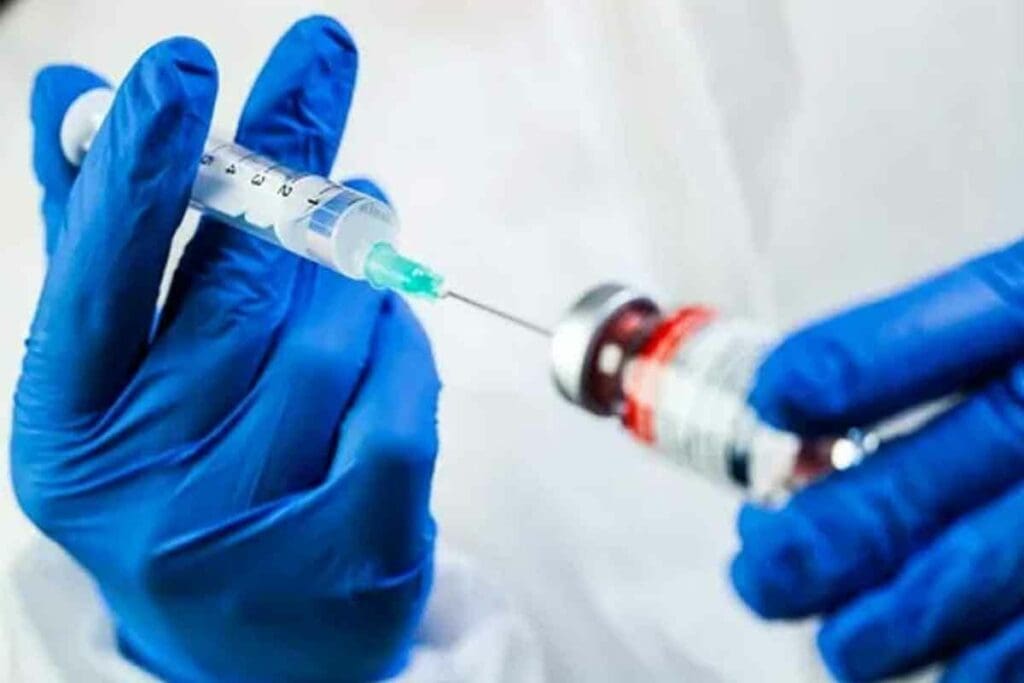Last Updated on November 17, 2025 by Ugurkan Demir

Vitamin B12 is key for our health. Injections are a main treatment for those who lack it.Explore safe B12 injection dosage and frequency tips for maintaining proper vitamin B12 levels.
At Liv Hospital, we know how important the right vitamin B12 injections dosage is. We follow strict treatment plans.
The normal dose of B12 injection depends on how bad the deficiency is. It also depends on how well the body absorbs it.
We aim to help adults get the best treatment. We make sure it fits their specific needs.

Adults need enough Vitamin B12 for energy and nerve health. Vitamin B12, or cobalamin, is key for many body functions. We’ll look at its important roles and what happens if we don’t get enough.
Vitamin B12 is vital for several body functions:
A study in the Journal of Clinical Biochemistry says, “Vitamin B12 deficiency can cause big problems with nerves and blood.”
“Vitamin B12 is key for making DNA, fatty acids, and energy.”
Source: Journal of Clinical Biochemistry
A Vitamin B12 shortage can show in many ways, like:
| Symptom | Description |
| Fatigue | Persistent feeling of tiredness or lack of energy |
| Numbness/Tingling | Sensation of pins and needles in extremities |
| Difficulty Walking | Impaired balance and coordination |
Spotting these signs early is key for quick action. Healthcare experts often recommend Vitamin B12 injections for adults, mainly those with absorption problems or high needs.
Knowing how Vitamin B12 helps adults shows the need for the right amount and how to take it. The usual vitamin B12 intramuscular dosage is often suggested for treating deficiencies.

Some medical conditions make it hard for the body to absorb vitamin B12. This is why injections are needed to keep B12 levels up.
Many stomach and digestive problems can cause a lack of vitamin B12. These include:
In these cases, tiaminal B12 injection is a good way to get enough B12 without going through the digestive system.
Getting older increases the risk of vitamin B12 deficiency. This is because:
For older adults, the vitamin B12 injection dosage for adults might need to be adjusted. It’s important to keep an eye on B12 levels and give the right amount to avoid problems.
Knowing which medical conditions need B12 injections is key to treating them well. Healthcare providers can give the right b12 injection dose for adults based on each person’s needs. This helps keep everyone healthy.
Vitamin B12 injections come in different forms. Each has its own features. The right choice depends on the patient’s needs and health.
Cyanocobalamin and hydroxocobalamin are two common B12 types for injections. Cyanocobalamin is a man-made B12 that’s stable and affordable. Hydroxocobalamin is more natural, similar to the B12 in our bodies.
Hydroxocobalamin lasts longer, meaning you might need fewer shots. But cyanocobalamin is safer and more widely used.
| Formulation | Characteristics | Usage |
| Cyanocobalamin | Synthetic, stable, cost-effective | Commonly used, well-established safety profile |
| Hydroxocobalamin | More natural, longer duration of action | Less frequent injections, suitable for specific patient needs |
Tiaminal B12 injections mix B12 with thiamine (Vitamin B1). They aim to boost B12’s benefits by adding extra nutrients.
These injections are good for those with certain deficiencies or needing more nutrients. But, a doctor should decide the best one for you.
Always talk to a doctor to find the best B12 shot for you. Knowing about the different types helps you make better choices for your health.
The amount and how often B12 injections are given can change based on each person’s needs. These injections are key for treating B12 deficiency. Knowing the right dose is vital for good care.
For B12 injections, there’s a standard plan. It starts with a big dose to fill up the body’s stores. Then, smaller doses keep those levels up.
Initial Loading Dose: At first, people get 1000 mcg every week for 4-8 weeks. This quickly boosts vitamin B12 levels in those who are low.
Maintenance Therapy: Once the big dose is done, smaller doses are given every 1-3 months. This depends on how well the body responds and what it needs.
| Treatment Phase | Dosage | Frequency |
| Initial Loading | 1000 mcg | Weekly for 4-8 weeks |
| Maintenance | 1000 mcg | Every 1-3 months |
Many things can change how much B12 someone needs. For example, how bad the deficiency is, or if the body can’t absorb it well. People with severe issues might need more or more often.
“The dosage and frequency of B12 injections should be tailored to the individual patient’s needs, taking into account factors such as the severity of deficiency and ongoing absorption issues.”
Other things like age, health problems, and symptoms can also play a part. Doctors must look at these to figure out the best treatment.
Doctors can make B12 injections work best for their patients by knowing the standard doses and what affects them. Keeping an eye on how it’s going and making changes is key to success.
Starting B12 injection therapy requires knowing the initial loading dose. This phase quickly fills up the body’s vitamin B12 stores. It’s key for those with severe deficiencies or long-term symptoms.
The 1000 mcg weekly protocol is a common start. It means getting 1000 mcg (1 mg) of B12 injected once a week. This high dose quickly fills up the body’s stores, helping symptoms improve faster.
This dose is safe and works well for most adults. It’s much higher than the daily need of 2.4 mcg for adults. This is because many people can’t absorb enough B12 from food.
The length of the loading phase varies. It usually lasts weekly for 4-8 weeks. Doctors might adjust this based on how the patient responds and their health.
Important factors for the loading phase include:
By following this guideline, doctors can quickly restore vitamin B12 levels. This improves patient outcomes. The next step is maintenance dosing, which we’ll cover next.
After the first phase, patients move to a maintenance dosing schedule for vitamin B12 therapy. This phase is key to keeping vitamin B12 levels right and ensuring health benefits last.
Maintenance dosing schedules are less often than the first doses, usually monthly. The exact timing depends on the patient’s needs, like how severe the deficiency is and how well they absorb the vitamin.
Many patients get monthly B12 injections. This keeps vitamin B12 levels up between shots, helping health and preventing symptoms. The dose for these shots is usually between 1000 mcg and 2500 mcg, given in the muscle.
Adjusting the dose and frequency is key in the maintenance phase. Doctors watch for signs like more energy and better test results to see if the dose is right.
The dose frequency might change based on how a patient responds. Some might need shots more often, while others can go longer between them. This depends on their health, how well they absorb the vitamin, and their lifestyle.
Regular check-ups with doctors are important to see if the dosing schedule is working. Tests like vitamin B12 levels and blood counts help guide the dosing.
Customizing maintenance dosing for each patient helps make vitamin B12 therapy more effective. This supports long-term health goals.
The way B12 injections are given, either intramuscularly or intravenously, affects how well they work. We’ll look at the differences between these methods. This will help healthcare providers make better choices.
Intramuscular B12 injections are often used for people with absorption problems. The usual intramuscular dose is between 1000 mcg and 2500 mcg per shot. These shots are given weekly or monthly, based on the patient’s needs and how they’re doing.
The intramuscular method helps B12 absorb slowly. This keeps levels steady. It’s important to use the right injection techniques and change the injection site often. This reduces pain and lowers the chance of problems.
Intravenous B12 injections deliver the vitamin directly into the bloodstream. This is useful in some cases. The B12 intravenous dose is usually the same as the intramuscular dose, from 1000 mcg to 2500 mcg per infusion.
IV B12 protocols involve mixing the vitamin with saline and giving it over 30 minutes to an hour. This method quickly fills up B12 stores. It’s good for patients with severe deficiencies or who need quick treatment.
When deciding between intramuscular and intravenous, we look at the patient’s health, how bad their B12 deficiency is, and how they react to treatment.
In summary, both intramuscular and intravenous methods have their uses in B12 therapy. Knowing the guidelines for each helps healthcare providers tailor treatment. This makes B12 therapy more effective for each patient.
Getting the right amount of vitamin B12 in injections is very important. B12 injections have different strengths, and knowing this helps us give the right dose.
Healthcare providers must think about both the dose and the strength of the B12 solution. Most B12 injections are 1000 mcg/mL, but there are other options too.
The dose of vitamin B12 for adults is usually in micrograms (mcg). But, knowing the volume (in mL) is also key for giving the shot.
It’s very important to check the strength of the B12 product you’re using. This makes sure you’re giving the right amount.
B12 injections come in different strengths, like 1000 mcg/mL, 500 mcg/mL, and more. The strength you choose depends on the patient’s needs and the doctor’s advice.
When you switch to a different strength, you need to change the amount you give. This keeps the dose the same.
For example, if a patient gets 1000 mcg in 1 mL of 1000 mcg/mL solution, changing to 500 mcg/mL means you need 2 mL to get the same dose.
Key considerations include:
By following these guidelines, healthcare providers can make sure patients get the right amount of vitamin B12. This helps the treatment work best.
It’s key to keep an eye on B12 treatment plans to get the best health results. A good plan includes lab tests and doctor checks to make sure it’s working right.
Lab tests are important to see if B12 shots are helping. We suggest doing blood tests and B12 level checks often. How often depends on the person’s health and how they’re doing with treatment.
Initial testing: Do CBC and B12 tests before starting treatment and again after the first dose.
Follow-up testing: Keep checking B12 levels and adjust treatment as needed, every 3-6 months.
Doctor checks are also important to see if B12 shots are working. We look for signs like less fatigue, better nerve function, and feeling better overall.
By using lab tests and doctor checks together, we can make B12 treatment better for our patients.
When figuring out B12 injection dosages and how often to give them, special groups need special care. This includes the elderly and those with neurological issues. They need treatments that fit their needs for the best results.
Elderly patients face unique challenges with vitamin B12 injections. Their bodies naturally slow down with age, and they might have other health issues. This can make it harder for them to absorb and use vitamin B12.
Studies show that older adults might need more B12 or it more often. This is because their bodies make less of a key helper for B12 and absorb it less well.
Here’s what we recommend for elderly patients:
A study in the Journal of Gerontology stressed the need for B12 in older adults. It said that “Vitamin B12 deficiency is common among older adults and can have significant health implications if left untreated.”
Those with neurological symptoms from B12 deficiency need special care. Symptoms like nerve damage or brain fog can be helped by quick action.
Here’s what we suggest for these patients:
Experts say that
“High-dose vitamin B12 therapy can lead to significant improvements in neurological function in patients with deficiency-related neuropathy.”
In short, customizing B12 injection plans for the elderly and those with neurological issues is key. This way, healthcare providers can give better, more tailored care.
To safely give yourself B12 injections, you need to follow certain steps. Giving yourself B12 injections is handy for those who need them often. But, it’s important to get the right training and follow safety rules.
First, you need a doctor’s prescription for B12 injections. It’s key to have a doctor watch over you. They will help figure out the right vitamin B12 injection im dose for you and check how you’re doing.
Seeing your doctor regularly is important. They can change your dose if needed and help with any side effects. This keeps your treatment working well and safe.
Learning the right way to give yourself a tiaminal B12 injection is key. You should know how to hold the syringe, inject at the right angle, and throw away used needles safely.
It’s also important to change where you inject to avoid problems. Your doctor will tell you how to move the injection site. You can inject in the deltoid, gluteal, or thigh muscles.
By sticking to these rules and getting help from a doctor, you can safely give yourself b12 injection dose for adults. This way, you get the benefits without the risks.
Getting the most out of B12 injection therapy is key for long-term health, mainly for adults with low B12 levels or trouble absorbing it. We’ve shared seven important tips to help doctors and patients deal with the challenges of B12 treatment.
Knowing the right b12 injection dose for adults and how often to get it can greatly boost health. The vitamin B12 iv dose and how it’s given can be adjusted to fit each person’s needs.
Creating a treatment plan that’s just right for you is essential. Doctors are important in figuring out the best vitamin B12 injection dosage for adults and how to give it, like through shots or IVs.
We’re dedicated to giving detailed advice and support to doctors and patients. By sticking to these tips and making treatment fit each person’s needs, we can help them get the best results from B12 therapy.
The first dose is usually 1000 mcg weekly. But, it can change based on how bad the deficiency is and what the patient needs.
For keeping up the treatment, injections are often given monthly. But, the schedule can change based on how well the patient is doing and ongoing checks.
Both cyanocobalamin and hydroxocobalamin are Vitamin B12 types used in shots. Cyanocobalamin is more common. Hydroxocobalamin might stay in the body longer.
Yes, you can give yourself B12 shots if you’re trained and have a doctor’s watch. It’s key to follow the doctor’s orders and learn how to inject right.
Knowing the B12 shot’s strength is important. Shots come in different strengths. The dose is measured in milliliters (mL) or micrograms (mcg).
If you keep feeling tired or have other B12 deficiency symptoms, it might be time to check your treatment. Blood tests can show if you need to change your treatment.
Yes, older patients might need special treatment plans. This is because age can affect how well the body absorbs and uses B12.
Tiaminal B12 shots might help some patients more. But, whether or not to use them should depend on what each patient needs and what the doctor says.
Most B12 shots are given in the muscle. But, in some cases, like severe deficiency, shots might be given through a vein.
Blood tests, like B12 levels and complete blood counts, help check if the treatment is working. They also help make changes as needed.
B12 shots are usually safe. But, it’s important to keep watching how you’re doing to avoid any problems and make sure you’re getting the best treatment.
Yes, B12 shots are key for treating neurological symptoms caused by B12 deficiency. Treatment plans can be made to meet these specific needs.
Having a doctor watch over your B12 shots is very important. They help make sure you’re getting the right dose, how to get it, and check on how you’re doing.
References:
Subscribe to our e-newsletter to stay informed about the latest innovations in the world of health and exclusive offers!